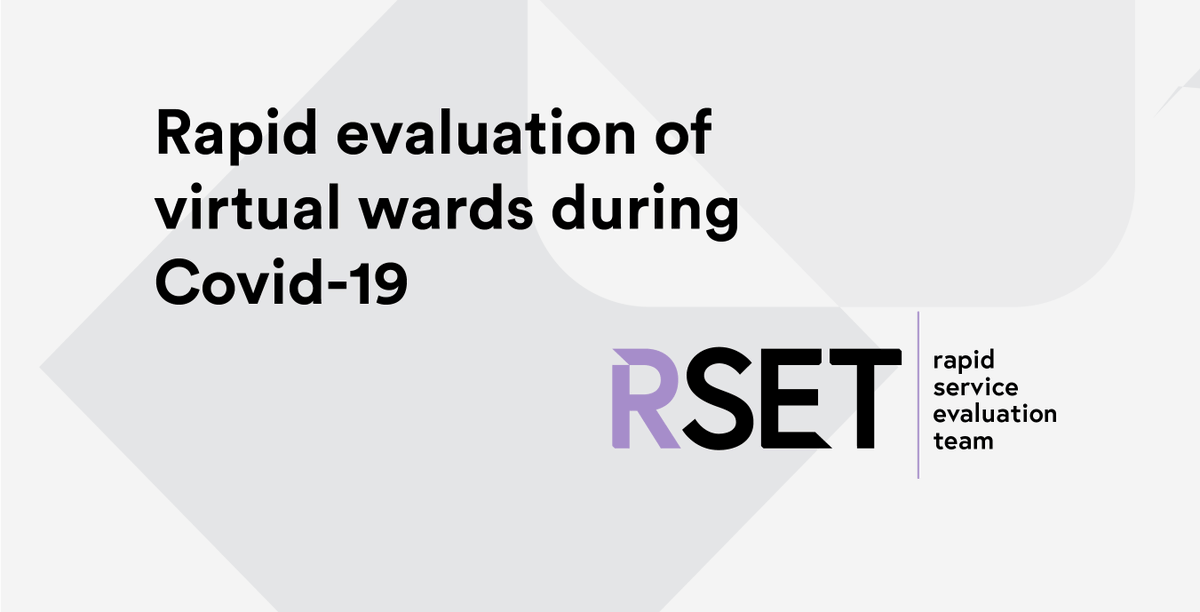Our rapid service evaluation team (NIHR RSET), a partnership between @UCL and the @NuffieldTrust, is doing some fascinating work evaluating ‘virtual wards’ for #COVID19 patients. Some important findings are emerging. (thread)  @NIHRresearch @uclnews
@NIHRresearch @uclnews
 @NIHRresearch @uclnews
@NIHRresearch @uclnews
Virtual wards give patients who might get very sick tools to allow them to monitor their vital signs (oxygen levels, blood pressure etc) from their own homes. Prof Naomi Fulop, @CeciliaVindrola & @trishgreenhalgh have written an explainer on them here.
Prof Naomi Fulop, @CeciliaVindrola & @trishgreenhalgh have written an explainer on them here. https://www.nuffieldtrust.org.uk/news-item/virtual-wards-caring-for-covid-19-patients-at-home-could-save-lives
https://www.nuffieldtrust.org.uk/news-item/virtual-wards-caring-for-covid-19-patients-at-home-could-save-lives
 Prof Naomi Fulop, @CeciliaVindrola & @trishgreenhalgh have written an explainer on them here.
Prof Naomi Fulop, @CeciliaVindrola & @trishgreenhalgh have written an explainer on them here. https://www.nuffieldtrust.org.uk/news-item/virtual-wards-caring-for-covid-19-patients-at-home-could-save-lives
https://www.nuffieldtrust.org.uk/news-item/virtual-wards-caring-for-covid-19-patients-at-home-could-save-lives
During the first wave of Covid-19, 8 sites across England were piloting the use of remote home monitoring to help patients at risk of needing hospital care.  What did we find? The short answer is a lot! Here are some of the key findings:
What did we find? The short answer is a lot! Here are some of the key findings:
 What did we find? The short answer is a lot! Here are some of the key findings:
What did we find? The short answer is a lot! Here are some of the key findings:
Patient experience was reported as positive and staff described high levels of patient engagement. It sounds obvious but patient/carer training is really important to make these tools a success. 

Some concerns were raised about how sustainable these services are: they were set up quickly with discretionary input but need dedicated funds and management support and need for better integration with NHS #TestandTrace. 

We also found some real barriers to using these models: it’s challenging for staff to assess how people are doing other than through discussion alone; it wouldn’t be appropriate for some groups like homeless people; there needs to be culturally appropriate patient info.
The full findings can be found via our slide pack  https://www.nuffieldtrust.org.uk/files/vw-evaluation-final-slideset-for-dissemination-12th-oct-2020.pdf and the preprint of empirical findings. https://www.medrxiv.org/content/10.1101/2020.11.12.20230318v1
https://www.nuffieldtrust.org.uk/files/vw-evaluation-final-slideset-for-dissemination-12th-oct-2020.pdf and the preprint of empirical findings. https://www.medrxiv.org/content/10.1101/2020.11.12.20230318v1
 https://www.nuffieldtrust.org.uk/files/vw-evaluation-final-slideset-for-dissemination-12th-oct-2020.pdf and the preprint of empirical findings. https://www.medrxiv.org/content/10.1101/2020.11.12.20230318v1
https://www.nuffieldtrust.org.uk/files/vw-evaluation-final-slideset-for-dissemination-12th-oct-2020.pdf and the preprint of empirical findings. https://www.medrxiv.org/content/10.1101/2020.11.12.20230318v1
 These have been shared widely with national leaders and those planning services locally: they were used by the @NHSEngland’s National Incident Response Board to support the national roll out of the COVID Oximetry at Home model (covered by the @BMJ here: https://www.bmj.com/content/371/bmj.m4151)
These have been shared widely with national leaders and those planning services locally: they were used by the @NHSEngland’s National Incident Response Board to support the national roll out of the COVID Oximetry at Home model (covered by the @BMJ here: https://www.bmj.com/content/371/bmj.m4151)
 So what’s next? We are working with BRACE, @NHSEngland, @PHE_uk, @mattinadakim and others to look at the use of remote monitoring in wave 2 and understand more about issues like effectiveness and patient experience.
So what’s next? We are working with BRACE, @NHSEngland, @PHE_uk, @mattinadakim and others to look at the use of remote monitoring in wave 2 and understand more about issues like effectiveness and patient experience.
 This will be published in 2021 and we will share findings via our dedicated RSET webpages here.
This will be published in 2021 and we will share findings via our dedicated RSET webpages here.  https://www.nuffieldtrust.org.uk/rset-the-rapid-service-evaluation-team
https://www.nuffieldtrust.org.uk/rset-the-rapid-service-evaluation-team

 Read on Twitter
Read on Twitter


